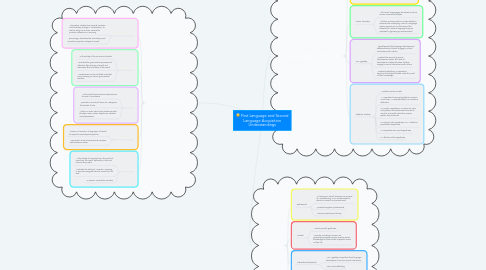
1. Language Acquisition Theorists
1.1. B.F Skinner
1.1.1. - children learn language based on behaviourist reinforcement principles.
1.1.2. - gives importance to the environment as the source of everything the child needs to learn
1.1.3. - Imitation and practice as the primary proceses in language development
1.2. Noam Chomsky
1.2.1. - all human langugages are based on some innate universal principles
1.2.2. - children are born with an innate ability to discover the underlying rules of a language system (grammar) on the basis of the samples of a natural language they are exposed to (growing up environment).
1.3. Lev Vygotsky
1.3.1. - hypothesized that language development obtained when children engage in social interactions with others.
1.3.2. - created the zone of proximal development (ZPD): the level of development obtained when children engage in social interactions with others
1.3.3. - created scaffolding: a supportive structure that helps children make the most of their knowledge
1.4. Stephen Krashen
1.4.1. - created monitor model
1.4.2. 1. Acquisition learning hypothesis: acquire L2 as how L1 is acquired (with no conscious attention)
1.4.3. 2. Monitor Hypothesis: L2 users are rules and patterns that have been learned to monitor and polish what the acquire system has produced
1.4.4. 3. Natural order hyptphesis: SLA unfolds in predictable sequences
1.4.5. 4. Comprehensice input hypotheiss
1.4.6. 5. Affective Filter hypothesis
2. Theories
2.1. Behaviorist
2.1.1. - is learning in which learning is a process of "conditioning" in an environment of stimulus, reward, and punishment
2.1.2. - positive/negative punishments
2.1.3. - Skinner's behaviorist theory
2.2. Innatist
2.2.1. - critical period hypothesis
2.2.2. - animals, including humans, are genetically programmed to acquire certain knowledge or kinds of skill at specific times in their life
2.3. Interactionist (Natural)
2.3.1. - Lev Vygotsky's hypothsis that language development occurs in social interaction
2.3.2. - ZPD and scaffolding
2.4. Socio/Culturalist
2.4.1. - looks at the importance of contributions that the society makes to individual development
2.4.2. - the relationship between developing people and the culture in which they live in
3. Language Elements
3.1. Phonolgy/Phonetics
3.1.1. - phonetics: studies how sounds combine and how they change in combination, as well as which sound can contrast to produce difference in meaning
3.1.2. - phonology: describes the articulatory and acoustic properties of speech sound
3.2. Morphology
3.2.1. - is the study of the structure of words
3.2.2. - includes the grammatical processes of inflection (the change of word) and derivation (the formation of the word)
3.2.3. - morphemes are the smallest units that carry meaning or have a grammatical function
3.3. Syntax
3.3.1. - is the order that words and phrases are formed in a sentence
3.3.2. - provides a structural frame for categoires that words fit into
3.3.3. - helps us under stand how sentences work through nouns, verbs, adjectives, adverbs, and prepositions
3.4. Lexicon/Semantics
3.4.1. - lexicon: all words in a language, all words for specific area/subject/expertise
3.4.2. - semantics: study of what words, phrases, and sentences mean
3.5. Pragmatics
3.5.1. - is the study of language from the point of view from the users, especially in terms of choices they make
3.5.2. - includes the study of "invisivle" meaning or how we recognize what is meant but not said
3.5.3. - is used in contrast to sematics
